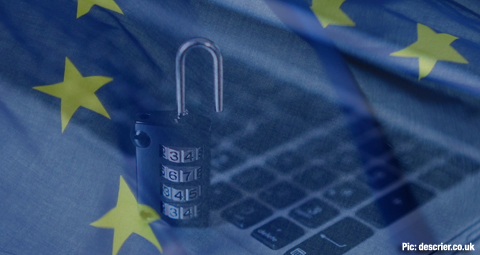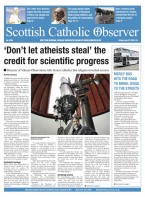BY Daniel Harkins | May 25 | ![]() 0 COMMENTS
0 COMMENTS ![]() print
print

Sick lists hit by new EU data law
Catholic families in Glasgow have been hit by a new EU directive that restricts parishes from praying for the sick.
The General Data Protection Regulation 2018 comes into force this month and has forced organisations across the continent to fundamentally rework their approach to data protection. The Catholic Church in Scotland has been striving to comply with the regulations, and as a result, Scotland’s largest diocese has told its parishes that they need permission from an ill person before they can publish their name on a list of prayers for the sick.
“The advice we have been given at the moment is that a person’s name should only appear in a parish sick list when they have given prior written permission,” a spokesperson for Glasgow Archdiocese said. “Obviously in the case where someone has been taken ill suddenly and without warning, such prior written permission is not a realistic option. This would appear to be an unintended consequence of a much wider law which affects all organisations which hold data on individuals.”
The spokesperson added: “It may be that as time passes a clearer picture will emerge about such issues, but for now we have been advised that it is best to be careful to avoid unintended breaches.”
A spokesperson for the Catholic Church Insurance Association (CCIA) subsequently told the SCO that when the name of the sick person is only being distributed to members of the parish, it is their view that this can go ahead under GDPR.
“For years, Catholic parishes have adopted the practice of including parishioners’ names on sick lists at the request of the sick person or person close to them,” they said. “Where a sick parishioner’s name is included in a newsletter which is only distributed to members of the parish, our view is that practice can continue under the GDPR on the basis that it is in the parish’s legitimate interests as a religious body to process that personal data.
“However, if the newsletter is made available more widely (e.g. posted on the parish website), then our advice to parishes is not to include the names of sick parishioners unless they have given their explicit consent.”
Most parishes in Scotland publish regular lists of the sick and ask for prayers, and do not routinely seek permission from the ill person, often as they are not well enough to do so. A number lay groups in Scotland, including Catholic Charismatic Renewal, also circulate names of the sick on prayer lists.
Teresa Barnes is involved in a prayer list with Charismatic Renewal. People will often text her names of friends and family members to be added to a list that her group prays for. She said the new legislation could cause problems if it was enforced widely.
“I understand the problem, and people can still be prayed for without a name, but when you have the name it is a lot easier to pray,” she said.
She added that only on one occasion had someone had an issue with their name being added to a prayer list.
Announcing the move in their parish bulletin, one parish, Holy Family and St Ninian in Kirkintilloch, wrote: “Parishes have been advised that names of the sick can no longer be published in the bulletin without the direct permission of the sick person to the parish priest. Names cannot be put on the sick list via a third party. All names on the present sick list will be removed next week. GDPR does not apply to the deceased.”
In St Aloysius Church in Glasgow, the bulletin informed parishioners: “We will… only publish names of those who ask personally for their name to be added to the prayer list.”
The Information Commissioner’s Office was contacted for a response and said they were aware of the problem, but were not immediately able to comment.
This post was updated to include comment from Catholic Church Insurance Association











